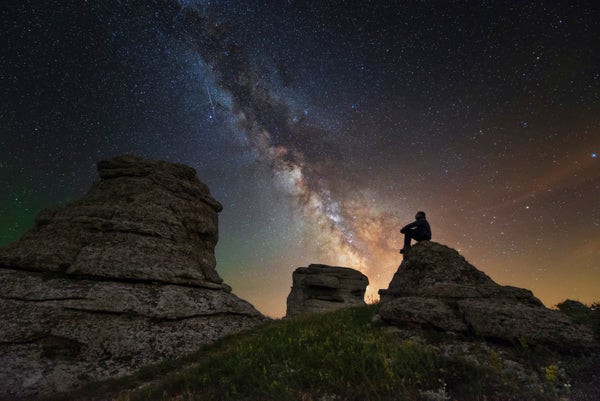This article was published in Scientific American’s former blog network and reflects the views of the author, not necessarily those of Scientific American
There is no mystery more fundamental than that of the meaning of life. We find ourselves on a stage without a script, so we naturally seek a purpose and wonder: What’s it all about?
We could simply live our life without assigning a deeper meaning to it, just as we casually use our liver without dissecting it. But sometimes our daily routines resemble those of Sisyphus, who according to Greek mythology was punished to roll a heavy boulder up a hill only for it to roll down when it reached the top, repeating the cycle again and again. In this context, it is reasonable to ask whether there is a point to our Sisyphean efforts.
The practical attitude is to accept life as a wonderful gift and make the best lemonade out of the lemons it brings. This echoes the organic relationship between a plant and the nutrients in the soil that feeds it. But it does not fulfil the need for a deeper meaning.
On supporting science journalism
If you're enjoying this article, consider supporting our award-winning journalism by subscribing. By purchasing a subscription you are helping to ensure the future of impactful stories about the discoveries and ideas shaping our world today.
Over history, humans sought goals that are more inspiring than their private lives. For example, during the Second World War, Japanese soldiers were willing to sacrifice their life for the sake of Emperor Hirohito. But in view of our recent realization that there are of order 1,000,000,000,000,000,000,000 (a zetta) habitable planets in the observable universe—the emperor’s status cannot be more significant than that of an ant hugging a single grain of sand on the landscape of a huge beach. And if an emperor’s influence is so miniscule on the cosmic scale, so is the impact of any other individual on Earth.
An alternative approach is to adopt the perspective of a spectator—enjoying the dazzling show around us rather than pretending to serve as one of its leading actors. If we are not already at awe while watching the rich spectacle of events on Earth, we can use our telescopes to capture the wider variety of displays farther away. Within the next decade, the Large Synoptic Survey Telescope (LSST) will deliver 500 petabytes of images from our cosmic environment. The experience will resemble a new subscription to a streaming media service, this one broadcasting the universe. The discoveries associated with this unprecedented flow of fresh astronomical information could shine a new light on our place in the cosmos.
But beyond recognizing what is out there, we could aspire to make a difference to the world by defining new challenges and striving to accomplish them. This mission can be pursued even as we age and move away from stressful engagements, by mentoring students who seek them. In the mind of a mentor, the pride associated with a protege overcoming obstacles reflects the celebration of the human spirit.
Personally, I have always been driven by the desire to understand something new about the universe that would change our cosmic perspective and stimulate our aspirations for space. I assign a meaning to my life by using the spectator perspective of an astronomer to motivate new challenges for our civilization on the cosmic stage. Given our many engineering accomplishments on Earth, a broader perspective could lead us to develop new technologies and modify our larger habitat through “space engineering.”
Among all astronomical data, the discovery of alien life could have the greatest impact on our broad outlook. The first traces of primitive life might be found as soon as the NASA and ESA rovers excavate the surface of Mars in 2021. In parallel, enigmatic signals or artificial infrastructure produced by technological civilizations might be detected remotely from a much larger search volume through "space archaeology."
A hypothetical example for a revelation that would assign a new meaning to our existence is the finding that life was planted artificially on Earth by another civilization. After all, my colleagues at Harvard are getting close to producing synthetic life in the laboratory, and once they do so, exporting it on a spacecraft could be a simple matter. If we originated from such a process of directed panspermia, then our life’s purpose must have been defined in the blueprint of the technological project that led to our synthetic origins. We were produced to address a goal. If so, what was the purpose and have we fulfilled expectations?
But even in the more likely case that life was the random outcome of natural circumstances in a soup of chemicals on isolated Earth, we might acquire a new meaning for it thanks to a communication from another civilization. If we ever establish contact with another intelligent species, the new perspective that it will bring could change our outlook. It is likely that we are not the smartest kid on the block, since their scientific research and development could have lasted billions of years, a factor of 10 million longer than ours.
The main benefit from an encounter with superior beings would be the opportunity to ask them the fundamental question that had been bothering us for ages: “What’s the meaning of life?” I hope to live long enough and be around for their answer, stemming from numerous millennia of acquired scientific knowledge. But at the same time, I worry that the response will be dead silence because they have not figured out the answer yet.
